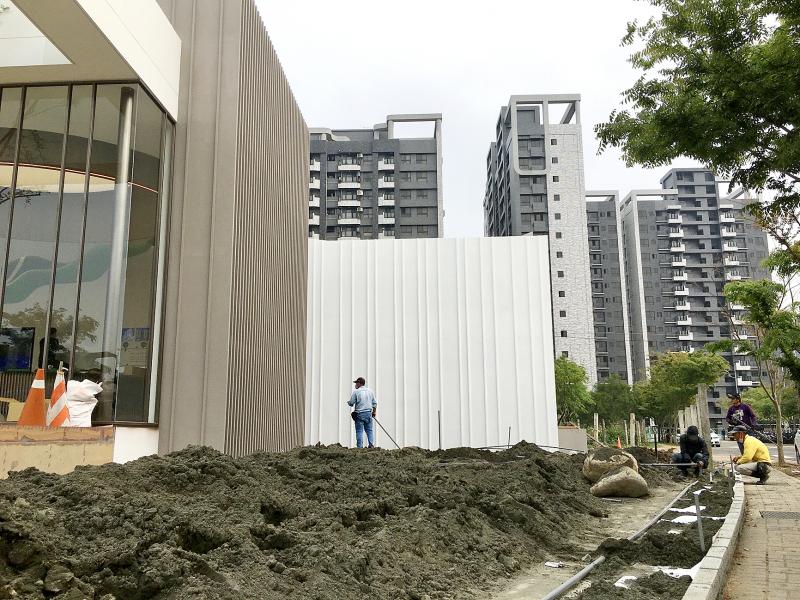New housing projects launched this month in northern Taiwan are likely to total NT$36 billion (US$1.22 billion), down 68 percent annually to the worst level in 20 years, as a spike in domestic COVID-19 infections chills buying interest, My Housing Monthly said yesterday.
The decline is smaller than at the height of the 2003-2004 SARS outbreak, partly because many civil servants are quarantined at home, stalling building permit reviews, the property publication said.
“This time around, the virus outbreak appears to be more effective than credit controls and other unfavorable policy measures at cooling the property market,” head researcher Ho Shih-chang (何世昌) said, adding that people have generally put house hunting on hold since the tally of daily new COVID-19 cases surpassed 80,000 earlier this month.

Photo: Hsu Yi-ping, Taipei Times
The situation is worse than during the level 3 COVID-19 alert in May last year when new housing projects in Taipei and New Taipei City alone exceeded NT$110 billion, Ho said, adding that people are assigning greater importance to disease prevention.
Developers and builders who are bold enough to launch projects are having difficulty getting permits because so many officials are infected or have had contact with someone who is, Ho said.
This month, Keelung has no new projects, while projects in Yilan fell 18 percent to only NT$900 million, it said.
New housing projects in New Taipei City shrank 80 percent to NT$10.3 billion, with the projects concentrated in less popular districts such as Sindian (新店), Linkou (林口) and Sansia (三峽), it said.
Opting to sit out the outbreak, builders are postponing launches in the most popular districts such as Banciao (板橋), Yonghe (永和) and Jhonghe (中和), it said.
New housing projects declined 72 percent to NT$8.2 billion in Taoyuan, while falling 90 percent to NT$1.1 billion in Hsinchu, where tight supply continues to push up selling prices, it added.
Taipei proved to be the only exception, with new housing projects increasing 7.6 percent to NT$15.5 billion, as developers press ahead with introducing small apartments, which have found solid support from real demand, Ho said.
Ho said the market is likely to rally next quarter as the number of COVID-19 cases dwindles, in line with trajectories in Hong Kong, South Korea and Singapore.

Taiwan Semiconductor Manufacturing Co (TSMC, 台積電) secured a record 70.2 percent share of the global foundry business in the second quarter, up from 67.6 percent the previous quarter, and continued widening its lead over second-placed Samsung Electronics Co, TrendForce Corp (集邦科技) said on Monday. TSMC posted US$30.24 billion in sales in the April-to-June period, up 18.5 percent from the previous quarter, driven by major smartphone customers entering their ramp-up cycle and robust demand for artificial intelligence chips, laptops and PCs, which boosted wafer shipments and average selling prices, TrendForce said in a report. Samsung’s sales also grew in the second quarter, up

LIMITED IMPACT: Investor confidence was likely sustained by its relatively small exposure to the Chinese market, as only less advanced chips are made in Nanjing Taiwan Semiconductor Manufacturing Co (TSMC, 台積電) saw its stock price close steady yesterday in a sign that the loss of the validated end user (VEU) status for its Nanjing, China, fab should have a mild impact on the world’s biggest contract chipmaker financially and technologically. Media reports about the waiver loss sent TSMC down 1.29 percent during the early trading session yesterday, but the stock soon regained strength and ended at NT$1,160, unchanged from Tuesday. Investors’ confidence in TSMC was likely built on its relatively small exposure to the Chinese market, as Chinese customers contributed about 9 percent to TSMC’s revenue last

On Tuesday, US President Donald Trump weighed in on a pressing national issue: The rebranding of a restaurant chain. Last week, Cracker Barrel, a Tennessee company whose nationwide locations lean heavily on a cozy, old-timey aesthetic — “rocking chairs on the porch, a warm fire in the hearth, peg games on the table” — announced it was updating its logo. Uncle Herschel, the man who once appeared next to the letters with a barrel, was gone. It sparked ire on the right, with Donald Trump Jr leading a charge against the rebranding: “WTF is wrong with Cracker Barrel?!” Later, Trump Sr weighed

LOOPHOLES: The move is to end a break that was aiding foreign producers without any similar benefit for US manufacturers, the US Department of Commerce said US President Donald Trump’s administration would make it harder for Samsung Electronics Co and SK Hynix Inc to ship critical equipment to their chipmaking operations in China, dealing a potential blow to the companies’ production in the world’s largest semiconductor market. The US Department of Commerce in a notice published on Friday said that it was revoking waivers for Samsung and SK Hynix to use US technologies in their Chinese operations. The companies had been operating in China under regulations that allow them to import chipmaking equipment without applying for a new license each time. The move would revise what is known